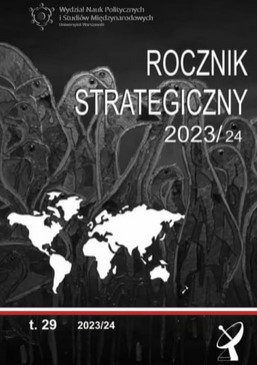Po pierwsze, bezpieczeństwo: polityka zagraniczna Polski
w drugim roku agresji Rosji na Ukrainę
Security first: Poland’s foreign affairs in the second year of Russia’s aggression in Ukraine
Author(s): Agnieszka Bieńczyk-MissalaSubject(s): Government/Political systems, International relations/trade, Security and defense, Military policy, Comparative politics, Peace and Conflict Studies, Russian Aggression against Ukraine
Published by: Wydawnictwo Naukowe Scholar Sp. z o.o.
Keywords: Poland’s foreign affairs; Poland’s security policy; NATO; European Union; Weimar Triangle; Visegrád Group; Lublin Triangle; Ukraine; Germany; France; Lithuania; Russia; Belarus; military spending;
Summary/Abstract: The chapter examines the evolution of Poland’s foreign policy in the second year of Russia’s aggression against Ukraine, focusing primarily on security issues. Po -land continued to pursue the enhancement of its military capabilities through the procurement of military equipment and the development of its armed forces. It declared its intention to bolster NATO and European security capabilities, albeit inconsistently. It refrained from engaging in cooperation with France and Germany and did not participate in any major European projects. In 2023, Poland allocated 3.9% of its GDP for military expenditure, the highest among all NATO countries. The comprehensive understanding and positive cooperation between Poland and Ukraine were put to a serious test in 2023 due to the so-called “grain conflict”. Russia’s aggressive policy, pursued in close cooperation with Belarus, was considered by Poland to be the greatest threat to peace in Europe, including Poland’s security. Poland systematically had to confront hostile actions in cyberspace and disinformation. During the rule of the Law and Justice Party, the country did not fully leverage the potential inherent in foreign policy instruments to pursue state interests. While the authorities participated in various consultations regarding future agreements up until the NATO summit in Vilnius in July, in the subsequent months, their focus shifted to the electoral campaign. The post-election turn in Poland, with Donald Tusk returning to the position of Prime Minister and Radosław Sikorski returning to the position of Minister of Foreign Affairs, largely signifies a return to predictable foreign policy that Poland pursued in the years 2007–2015.
Journal: Rocznik Strategiczny
- Issue Year: 2024
- Issue No: 29
- Page Range: 324-337
- Page Count: 14
- Language: Polish

